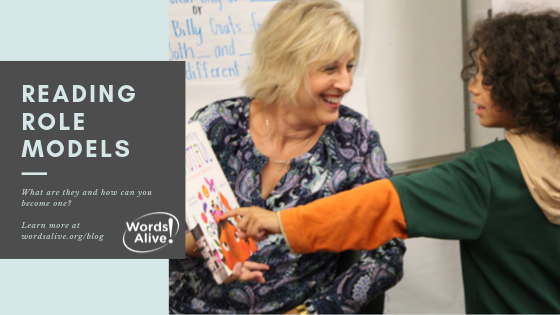By Omar Jawdat, Blog Intern
A graphic that shows one of our volunteers holding up a book while a student points at it. The text says, “Reading Role Models: What are they and how can you become one?”
Reading role models help encourage children not just to read, but to have fun while reading! Kids are influenced by their parents, teachers, and care-givers, all of whom can be considered role models for reading. It is important for these role models to influence their kids by demonstrating enthusiasm while reading, and helping them discover new and diverse forms of literature. It is also important to be aware of a child’s reading. When kids feel that their work is valued, they are also encouraged to continue their choice to read. Reading role models are overall “critical to instilling reading as an integral part of a child’s life.”
Children who are frequent readers tend to have more reading role models. Frequent readers also tend to have greater access to books. Unfortunately, “having access to books, whether in or outside the home, is not a reality for all kids.” An estimated “103 books are present in home libraries of children ages 6-17, yet this varies widely. Most strikingly, frequent readers have an average of 139 books in their homes vs. 74 in infrequent readers’ homes.” 42% of frequent-reading kids claim that they have trouble seeking books that catch their interest. Infrequent readers have a 59% chance of not being able to find books that they are interested in reading.
Therefore, it’s important for libraries to provide a wide range of diverse books that include different types of stories, characters, and plots. As kids grow older, their interests can change, and their curiosity and eagerness for knowledge grows with them.
Reading Role Models at Words Alive!
All volunteers at Words Alive are reading role models, especially volunteers in the Read Aloud Program and the Adolescent Book Group. These volunteers dedicate their time and read together with students and kids of all ages (from elementary school to high school and college), discussing the stories and talking about how the book impacts them in different ways. For children, it serves to help develop cognitive, language, and social-emotional skills as they grow. Having a reading role model at Words Alive makes students aware of the importance of literacy, and helps explore the values of books, reading them not just as an assignment, but as a hobby and passion.
Sources:
www.scholastic.com/readingreport/access-matters.html
www.huffpost.com/entry/be-a-reading-role-model_b_5813a56ae4b08301d33e0906

